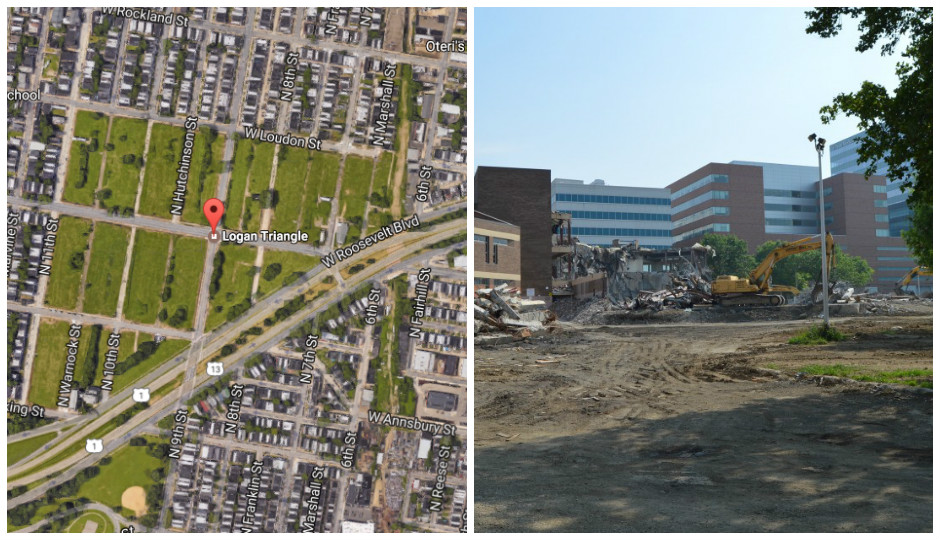State Rejects Philly’s Bid to Expand Tax-Free Zones to Logan Triangle, West Philly

Development projects are planned for Logan Triangle (L) and the former University City High School (R).
Over the summer, as the dust began to settle on another Pennsylvania budget negotiation, officials in Philadelphia’s Commerce Department realized that the state had opened the door for an expansion of Keystone Opportunity Zones, a program that’s meant to encourage investment in vacant and blighted areas by waiving certain state and local taxes.
Economic development officials love programs like the KOZ, which has helped to revitalize formerly vacant areas like the Navy Yard and the Cira Centre. So with a deadline of October 1st, the Commerce Department rushed to put together an application. The state law would make it possible to add up to 375 acres of property into KOZs that already exist in Philadelphia, according to Duane Bumb, senior deputy director in the department. The city identified 85 properties covering 322 acres of land, lobbied City Council members to approve the selections, secured agreements from participating property owners that payments in lieu of taxes (PILOTs) would keep the School District from losing any funding, and submitted the application.
The day before Thanksgiving, state government officials quietly sent a letter to the city. Christmas was cancelled, it said. The application wouldn’t be approved. The state couldn’t afford it.
“I am writing to inform you that the Department is not acting favorably on your request,” wrote Scott Dunkelberger of the state Department of Community and Economic Development. He continued:
In 2015, Governor Wolf proposed an overhaul of Pennsylvania’s tax system to make it more equitable to all of the Commonwealth’s citizens, school districts, businesses, and municipalities. Enacting these changes would make communities in every area of the state more attractive to businesses by giving them the resources to improve schools, public infrastructure, and public safety, all of which are critical to attracting business investment.
In 2017, enacting necessary changes to the tax system will again be discussed with the General Assembly. Until those important tax reforms are made, it is unlikely the Department will be designating any parcels of land for special tax treatment.
It wasn’t a total surprise. State officials had actually been encouraging municipalities not to submit applications for KOZ expansion over the summer, Bumb said. But the city had seen an opportunity to spur investment on some important development sites and went for it anyway. The state also received applications for KOZ expansions from Elk County, Chester County, and Clearfield County, according to Jeffrey Sheridan, a spokesman for Governor Tom Wolf. None of the applications will be accepted.
“Given the financial constraints of the commonwealth, we are not able to approve any additional special tax allowances at this time,” Sheridan said. Asked whether there were specific plans for tax-code changes, Sheridan only said that the Wolf administration would talk it over with the legislature.
In Philadelphia, sites included in the latest KOZ application include the long-vacant Logan Triangle property in North Philly and the former home of University City High School. Development projects are planned on both sites. Will the rejection of the KOZ application hinder those projects?
“Well I don’t know if ‘hinder’ is the right word, but it certainly puts us at a disadvantage relative to sites that do have KOZ,” said Joe Reagan, a senior vice president for development at Wexford Science & Technology, a group that is planning to build on the former school site. “I guess I’d say I would have been happier if we’d gotten it.”
Jamila Davis, a spokeswoman for the Philadelphia Redevelopment Authority, which is working on the Logan Triangle project with the Goldenberg Group, a private developer, also said the KOZ rejection wasn’t a dealbreaker.
“The KOZ would have been a useful tool for incentivizing development on the site, but we do not believe it will hinder our ability to move forward with the redevelopment as planned,” she said.
But by the theory of tax incentive programs like KOZ, which are only supposed to be used in circumstances where development wouldn’t occur otherwise, the rejection should slow things down at least. If not, wouldn’t that raise questions about whether the tax breaks were necessary in the first place?
Bumb said that the KOZ program is meant specifically to encourage job creation and the designation is used to attract commercial or industrial tenants to sites where developments might already be planned. So construction on the Wexford and Drexel project could move forward, as could the Logan Triangle project, even if it might be more difficult to entice tenants without the tax breaks.
Sites like the Navy Yard, where business has boomed in recent years after the land was deserted by the U.S. Navy, are proof that the Keystone Opportunity Zone program works, Bumb said. It remains to be seen whether the state will open up the program again next year. In the meantime, Bumb said, if a big tenant happens to sign a lease for one of the properties that was included in the rejected application, it probably just means that the Commerce Department was working with the owners and figured out a different way to entice them.
Follow @jaredbrey on Twitter.


